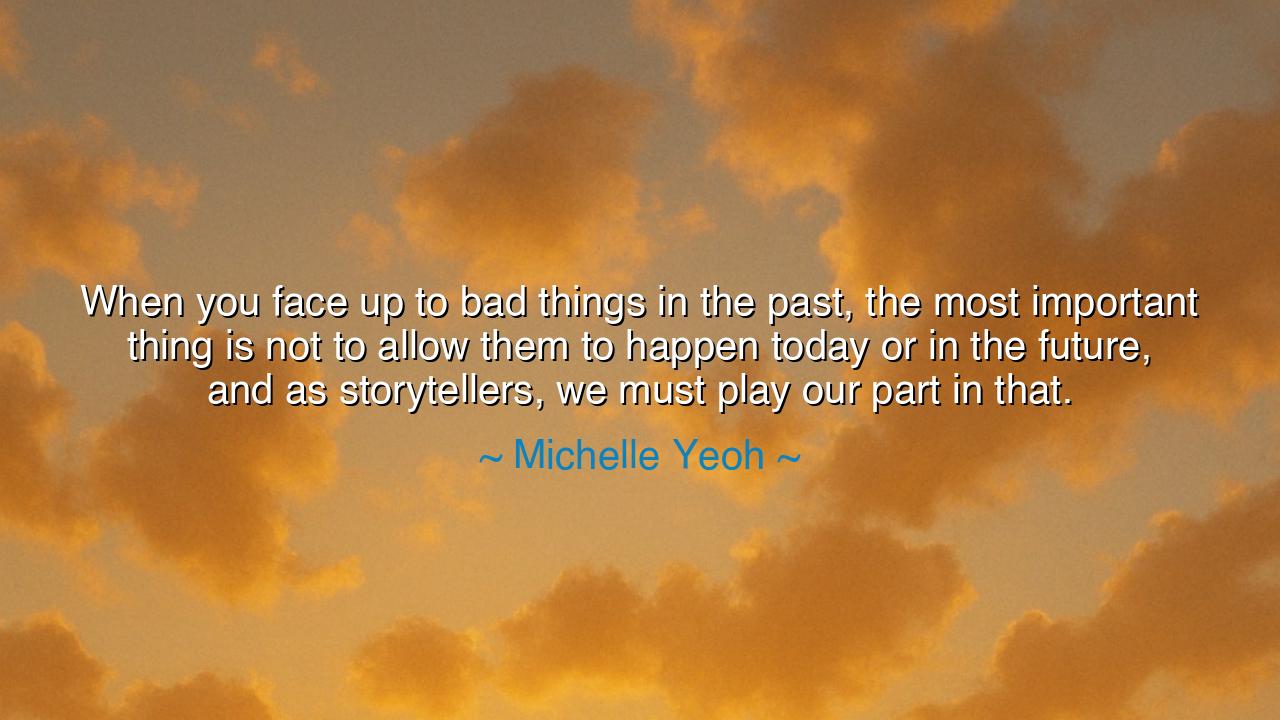
When you face up to bad things in the past, the most important
When you face up to bad things in the past, the most important thing is not to allow them to happen today or in the future, and as storytellers, we must play our part in that.






"When you face up to bad things in the past, the most important thing is not to allow them to happen today or in the future, and as storytellers, we must play our part in that." With these words, Michelle Yeoh speaks to the heart of the human condition—the necessity of confronting the past, learning from it, and ensuring that the mistakes and injustices of history do not repeat themselves. Yeoh's message emphasizes the responsibility we hold as storytellers—whether through film, literature, or personal narratives—to confront the darker aspects of history and illuminate the path forward, so that the same errors are not repeated in the future. In this way, she calls upon us to shape the future with wisdom, reflection, and action.
In the ancient world, the act of confronting past wrongs was not just an individual pursuit but a communal and cultural responsibility. The Greeks, through their tragic plays, explored the consequences of hubris and injustice, seeking to teach future generations the importance of self-reflection and accountability. Sophocles’ Oedipus Rex is a profound example of how confronting the past—no matter how painful—becomes necessary for restoration and growth. Oedipus, once king, faces the consequences of his ignorance and pride, and the tragedy unfolds as a result of his failure to acknowledge the past. His story is a timeless reminder that to ignore history is to be doomed to repeat it, and that true wisdom comes from accepting responsibility for what has been, and using it as a foundation for change.
Similarly, in Roman history, Cicero wrote extensively on the importance of morality and justice in governance. He believed that the past—especially the failures and tyrannies of earlier leaders—must serve as lessons for future rulers. Just as Cicero warned of the dangers of corruption and the misuse of power, so too does Yeoh remind us of the obligation we have to ensure that the sins of the past do not shape the future. The responsibility to educate, warn, and guide the future falls to those who possess the knowledge of history—the storytellers.
Take, for example, the story of Nelson Mandela, whose life was shaped by the history of apartheid in South Africa. Mandela faced a painful past—filled with oppression, injustice, and suffering—but he understood that the future of South Africa could not be built by denying that past. Through his leadership, he not only confronted the injustices of history but worked toward reconciliation and healing, ensuring that future generations would learn from the mistakes of the past. Mandela’s example teaches us that while we must acknowledge the past, we must also take responsibility for shaping the future—rejecting hatred and division in favor of unity and understanding.
Yeoh’s call for storytellers to play a role in this process is significant. A storyteller is not merely a recorder of events but a shaper of perception—someone who can highlight the lessons of history, call attention to the struggles and tragedies that have marked the human journey, and inspire change. Through film, art, or literature, the storyteller has the power to reflect the truths of history and challenge the collective memory of society. In this way, they do not just tell stories—they shape the future by ensuring that history is not forgotten and that its lessons are passed on.
The lesson here is clear: we cannot live in denial of the past, nor can we allow history to be buried or distorted. Yeoh’s words remind us that we have a responsibility to confront what has happened, to learn from it, and to ensure that future generations do not suffer from the same errors. Storytelling is a powerful tool in this process, one that allows us to reflect, to heal, and to transform. By embracing the lessons of the past, we can prevent them from being repeated and work toward a future defined by understanding, justice, and progress.
In practical terms, this means that we must actively engage with the past, learning its lessons through study and reflection, and making sure that we are passionate advocates for the truths of history. As individuals, we must be responsible for our actions, acknowledging the impact of our choices on those who come after us. As storytellers, we must take the mantle of educators—whether in the arts, in conversation, or in leadership—and use our platform to shape a future that learns from the mistakes of the past. By doing so, we can ensure that future generations are equipped not only with knowledge but with the wisdom to build a better world.






AAdministratorAdministrator
Welcome, honored guests. Please leave a comment, we will respond soon